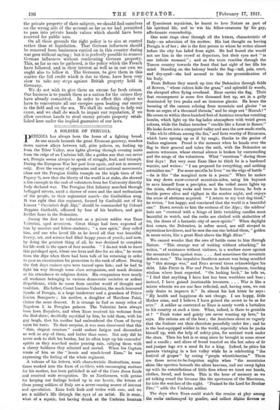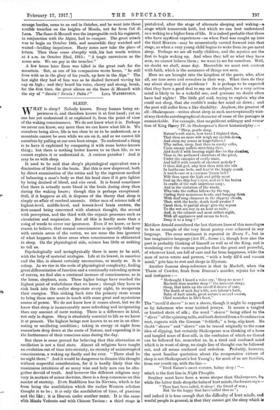A SOLDIER OF PERUGIA.
pERUGIA has always been the home of a fighting brood. As one stands beneath the great Etruscan gateway, wanders down narrow alleys between tall, grim palaces, or, looking up from the Tiber Valley, sees lights glowing through evening mists from the ridge of an Umbrian hill, like a golden sun that can never set, Perugia seems always to speak of struggle, feud, and triumph. During the European War her past lives again, and not in memory only. Ever the enemy of oppression and anti-national movements (does not the Perugian Griffin trample on the triple tiara of the Papacy ?), now that the liberty of the world is at stake, she showed a fine example in the rush of volunteers from her University directly Italy declared war. The Perugian 51st Infantry marched through beflagged streets, amid a shower of roses and the mad enthusiasm of the people, to their regimental march—the Garibaldian song. It was right that this regiment, formed by Garibaldi out of his famous " Cacciatori degli Alpi," should be commanded by Colonel Bcppino Garibaldi, officered by four of his brothers, and gain further fame in the Dolomites.
Among the first to volunteer as a private soldier was Enzo Valentini, aged seventeen. Great things had been expected of him by masters and fellow-students ; " a rare spirit," they called him, and one who loved life as he loved all that was beautiful. Poetry, art, and science had filled happy years of youth ; and now, by doing the greatest thing of all, ho was destined to complete his life-work in the space of four months. " I do-not wish to leave this privileged spot, where one lives and dies for an idea," he wrote from the Alps when there had been talk of his returning in order to pass an examination for promotion to the rank of officer. During the first days curious eyes were turned upon him; and he had to light his way through some class antagonism, and much derision at his attendance to religious duties. His companions were nearly all workmen belonging to various democratic societies or ardent Republicans, while he came from another world of thought and tradition. His father, Count Luciano Valentini, the much-honoured Syndic of Perugia, is a large landowner and a grandson of Prince Lucien Bonaparte ; his mother, a daughter of Marchese Faini, claims the same descent. It is strange to find so many relics of Napoleon I. in Perugian palaces. The Valentini have always been keen Royalists, and when Enzo received his welcome from the Red-shirts, decidedly mystified by him, he told them, with his gay laugh, that his mother had embroidered the Cross of Savoy upon his tunic. -To their surprise, it was soon discovered that this " thin, elegant creature " could endure fatigue and discomfort as well as any of them, and better than some. Not only did he never seek to shift his burden, but he often kept up his comrades' spirits as they marched under pouring rain, rallying them with a cheery boldness they admired and envied. When his Captain wrote of him as the " heroic and much-loved Enzo," he was expressing the feeling of the whole regiment.
A volume of his letters, with characteristic illustrations, some-
times worked into the form of cx-librie, with encouraging mottoes for his mother, has been published in aid of the Croce Roma funds and received wide recognition. To us Northerners, with genius for keeping our feelings locked up in our hearts, the letters of these young soldiers of Italy are a never-ceasing source of interest and speculation. Enzo both feels and writes with ease, and we Re a soldier's life through- the eyes, of an, artist. Ho is some. what of a mystic, but having drunk at the Umbrian fountain of Franciscan mysticism, he learnt to love Nature as part of his spiritual life, and -to win his fellow-creatures by his gay, affectionate comradeship.
Ono note rings clear through all the letters, characteristic of Italy—an adoration of his mother. His last thought on leaving Perugia is of her ; she is the first person to whom he writes almost before the city has faded from sight. Ho had feized she would not see him in the crowd at departure, but their eyes met " in one infinite moment" ; and as the train rumbles through the Tuscan country towards the front that last sight of her fills his mind. Standing on the balcony beside the flag—tall, pale, erect, and dry-eyed—she had seemed to him the personification of his Italy.
From Belluno they march up into the Dolomites through fields of flowers, " whose calixes hide the grass," and splendid fir woods, the shrapnel often flying overhead. Enzo carries the flag. Their first encampment is some five thousand feet up, set in a gully dominated by two peaks and an immense glacier. He hears the booming of the cannon echoing from mountain and glacier " as from an organ of a thousand throats," and he sings out "Hurrah 1" He comes to within three hundred feet of Austrian trenches vomiting bombs, which light up the fog-laden atmosphere with weird green colours, while the Italian trenches " crackle like a forest in flames."
He looks down into a conquered valley and sees the new-made roads, " like white ribbons among the firs," and forts worthy of Etruscans, which have sprung up as if by magic, thanks to the genius of Italian engineers. Proud is the moment when he hands over the flag to their general and takes the oath, with the Dolomites as austere witnesses, whose eternal silence is broken by cannonading and the songs of the volunteers. What " emotions " during those first days ! But very soon Enzo likes to think he is a hardened warrior, and writes : " I am prepared for everything, and nothing astonishes me." For some months he lives " on the edge of battle " —he is like " the marginal note in a poem." When he makes his way down snow-coverad mountain-sides, using his bayonet to save himself from a precipice, and the veiled moon lights up the mists, showing rocks and trees in human forms, he feels a hostile power alive and vigilant in the sombre night, and enjoys the sense of alertness acquired. " I return to my tent dog-tired," he writes, " but happy, and convinced that the world is a beautiful one." Dawn reveals to him the eeriness of tho Alps ; the soldiers' huts are " crowned with a fringe of little twinkling candles most beautiful to watch, and the rocks are clothed with stalactites of ice, the doors of a fantastic city of mow-spirits." When daylight first comes, the Dolomites, in softer mood, are still steeped in mysterious loveliness, and he sees the sun rise behind them, " golden in azure mists, like a great Host above the High Altar."
We cannot wonder that the awe of battle came to him through Nature. " This strange war of waiting without attacking," he writes, " of resistance without violence, is a warfare more against the mountain than against man. . . . And sometimes the mountain defeats man." The impulsive Southern nature was being moulded by " this strange war," and Enzo several times acknowledges his
debt. Like Pierre in War and Peace, he finds happiness, touching wisdom where least expected. " On looking back," he tells us,
" I find that anything I have lost has been worthless and base ; instead, I have gained inestimable treasures. . . . War is like a mirror wherein we see our face reflected, and, having seen, we can only desire to improve it." In almost his last letter ho says : "My health and happiness do not change. I am happy, little Mother mine, and I believe I have gained the secret to be so for ever." A soldier as contented as Enzo is surely worth a battalion to his country at such a time. What, indeed, is there to grumble at ? " Fresh water and gaiety are never wanting up here," he says. His rations are of the best ; the Austrians shoot so vaguely that the Italians eat their chocolate peacefully under fire ; and he is the best-equipped soldier in the world, especially when he packs himself up, with the help of safety-pins, for sentinel work under the stars. Then his but is so snug since he brought in some straw and a candle ; and slices of bread toasted on the hot ashes of fir and juniper logs are a meal fit for a king. Indeed, he pities his parents vintaging in a hot valley while he is celebrating " the festival of grapes" by eating "purple whortleberries." There
are those never-to-be-forgotten nights when " the mountains shine like spectres beneath the silent heavens, and our camp lights up with its constellations of little fires where we toast our hands, clothes, bread, and hearts. This is the hour of memory as we sit talking round the bivouac like the sportsmen of the Maremma, far into the watches of the night. ' Praised be the Lord for Brother Fire,' " adds tho Umbrian soldier.
The days when Enzra could watch the ermine at play among the rocks undisniayed by gunfire, said collect Alpine flowers or strange beetles, came to an end in October, and he went into.' those terrible trencliefr on the heights of Mesola, not fat fro'm Col di' Lana. The Sasso di Mezzodi was the impregnable rock his regiment, in conjunction with the Alpini, had to conquer. The great attack was to begin on October 18th, and meanwhile they watched and waited—bridling impatience. Hasty hetes now take the place of letters. Then these cease abruptly with;his last words written at 4 a.m. on October 22nd, 1915: " A tragic snowstorm as the moon sets. We are gay in the trenches."
A few hours later Enzo was killed in the great rush for the mountain. • But, as one of his companions wrote home, " he still lives with us in the glory of his youth, up here in the Alps." The last sight they had of him was as he dashed forward waving his cap on high ; and they heard his voice, cheery and strong, break, for the first time, the great silence on the Sasso di Mezzodl with the cry of " Scivoial Salvia ! Italia " LINA Werznpratn.



































 Previous page
Previous page